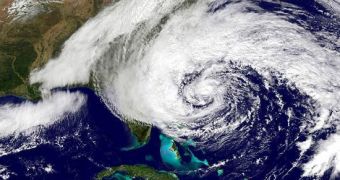On May 23, NOAA (the National Oceanic and Atmospheric Administration) announced that this year's Atlantic hurricane season has high chances of being an “extremely active” one.
Therefore, people in the United States would do best to get ready to face the major weather events set to come their way.
What NOAA means that the coming 6-month Atlantic hurricane season, which is to make its debut on June 1, will most likely witness the formation of 13 to 20 named storms.
The winds accompanying these storms are expected to reach speeds of at least 39 mph (62.7 kph), NOAA write on their website.
Of these 13 to 20 storms, 7 to 11 are bound to become hurricane whose average speed will be one of 74 mph (119 kph) or higher.
3 to 6 of these hurricanes have the potential to become major weather events, meaning that their winds speeds will reach at least 111 mph (178.6 kph).
NOAA Acting Administrator Kathryn Sullivan commented on this forecast as follows:
“With the devastation of Sandy fresh in our minds, and another active season predicted, everyone at NOAA is committed to providing life-saving forecasts in the face of these storms and ensuring that Americans are prepared and ready ahead of time.”
“As we saw first-hand with Sandy, it’s important to remember that tropical storm and hurricane impacts are not limited to the coastline. Strong winds, torrential rain, flooding, and tornadoes often threaten inland areas far from where the storm first makes landfall,” she went on to argue.
Seeing how an average of just 12 named storms, 6 hurricanes and 3 major hurricanes used to make up the Atlantic hurricane season in the past, some say this NOAA forecast brings new evidence in support of the idea that global weather patterns are indeed changing.
As Gerry Bell, Ph.D put it, “This year, oceanic and atmospheric conditions in the Atlantic basin are expected to produce more and stronger hurricanes.”
“These conditions include weaker wind shear, warmer Atlantic waters and conducive winds patterns coming from Africa.”

 14 DAY TRIAL //
14 DAY TRIAL //